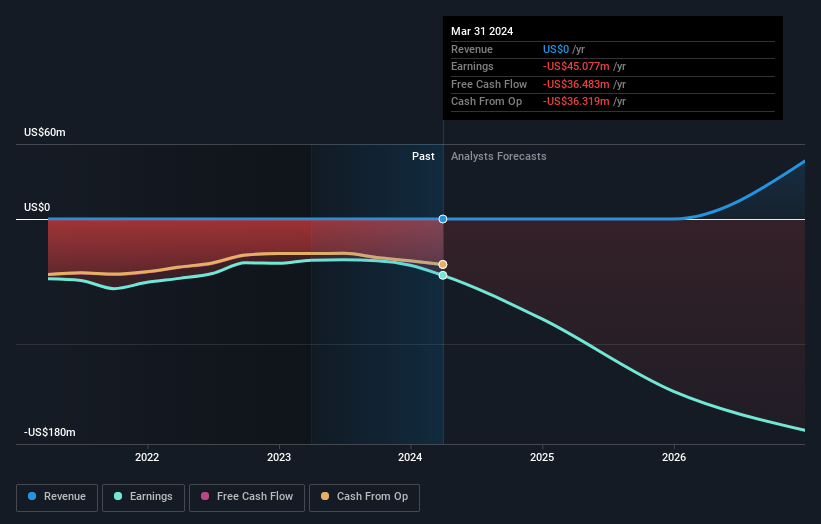Hedge funds owners may ignore Larimar Therapeutics, Inc.'s (NASDAQ:LRMR) recent US$71m market cap decline as longer-term profits stay in the green
Key Insights
- Significantly high institutional ownership implies Larimar Therapeutics' stock price is sensitive to their trading actions
- 53% of the business is held by the top 4 shareholders
- Recent purchases by insiders
Every investor in Larimar Therapeutics, Inc. (NASDAQ:LRMR) should be aware of the most powerful shareholder groups. With 33% stake, hedge funds possess the maximum shares in the company. That is, the group stands to benefit the most if the stock rises (or lose the most if there is a downturn).
No shareholder likes losing money on their investments, especially hedge funds investors who saw their holdings drop 14% in value last week. Still, the 98% one-year gains may have helped mitigate their overall losses. They should, however, be mindful of further losses in the future.
Let's delve deeper into each type of owner of Larimar Therapeutics, beginning with the chart below.
Check out our latest analysis for Larimar Therapeutics

What Does The Institutional Ownership Tell Us About Larimar Therapeutics?
Institutional investors commonly compare their own returns to the returns of a commonly followed index. So they generally do consider buying larger companies that are included in the relevant benchmark index.
As you can see, institutional investors have a fair amount of stake in Larimar Therapeutics. This can indicate that the company has a certain degree of credibility in the investment community. However, it is best to be wary of relying on the supposed validation that comes with institutional investors. They too, get it wrong sometimes. When multiple institutions own a stock, there's always a risk that they are in a 'crowded trade'. When such a trade goes wrong, multiple parties may compete to sell stock fast. This risk is higher in a company without a history of growth. You can see Larimar Therapeutics' historic earnings and revenue below, but keep in mind there's always more to the story.

Our data indicates that hedge funds own 33% of Larimar Therapeutics. That catches my attention because hedge funds sometimes try to influence management, or bring about changes that will create near term value for shareholders. Looking at our data, we can see that the largest shareholder is Deerfield Management Company, L.P. Series C with 33% of shares outstanding. For context, the second largest shareholder holds about 9.5% of the shares outstanding, followed by an ownership of 5.4% by the third-largest shareholder.
To make our study more interesting, we found that the top 4 shareholders control more than half of the company which implies that this group has considerable sway over the company's decision-making.
While studying institutional ownership for a company can add value to your research, it is also a good practice to research analyst recommendations to get a deeper understand of a stock's expected performance. There are plenty of analysts covering the stock, so it might be worth seeing what they are forecasting, too.
Insider Ownership Of Larimar Therapeutics
While the precise definition of an insider can be subjective, almost everyone considers board members to be insiders. Company management run the business, but the CEO will answer to the board, even if he or she is a member of it.
I generally consider insider ownership to be a good thing. However, on some occasions it makes it more difficult for other shareholders to hold the board accountable for decisions.
Shareholders would probably be interested to learn that insiders own shares in Larimar Therapeutics, Inc.. In their own names, insiders own US$5.3m worth of stock in the US$454m company. It is good to see some investment by insiders, but it might be worth checking if those insiders have been buying.
General Public Ownership
With a 19% ownership, the general public, mostly comprising of individual investors, have some degree of sway over Larimar Therapeutics. While this size of ownership may not be enough to sway a policy decision in their favour, they can still make a collective impact on company policies.
Private Equity Ownership
Private equity firms hold a 15% stake in Larimar Therapeutics. This suggests they can be influential in key policy decisions. Sometimes we see private equity stick around for the long term, but generally speaking they have a shorter investment horizon and -- as the name suggests -- don't invest in public companies much. After some time they may look to sell and redeploy capital elsewhere.
Next Steps:
It's always worth thinking about the different groups who own shares in a company. But to understand Larimar Therapeutics better, we need to consider many other factors. For example, we've discovered 5 warning signs for Larimar Therapeutics (2 shouldn't be ignored!) that you should be aware of before investing here.
But ultimately it is the future, not the past, that will determine how well the owners of this business will do. Therefore we think it advisable to take a look at this free report showing whether analysts are predicting a brighter future.
NB: Figures in this article are calculated using data from the last twelve months, which refer to the 12-month period ending on the last date of the month the financial statement is dated. This may not be consistent with full year annual report figures.
Have feedback on this article? Concerned about the content? Get in touch with us directly. Alternatively, email editorial-team (at) simplywallst.com.
This article by Simply Wall St is general in nature. We provide commentary based on historical data and analyst forecasts only using an unbiased methodology and our articles are not intended to be financial advice. It does not constitute a recommendation to buy or sell any stock, and does not take account of your objectives, or your financial situation. We aim to bring you long-term focused analysis driven by fundamental data. Note that our analysis may not factor in the latest price-sensitive company announcements or qualitative material. Simply Wall St has no position in any stocks mentioned.